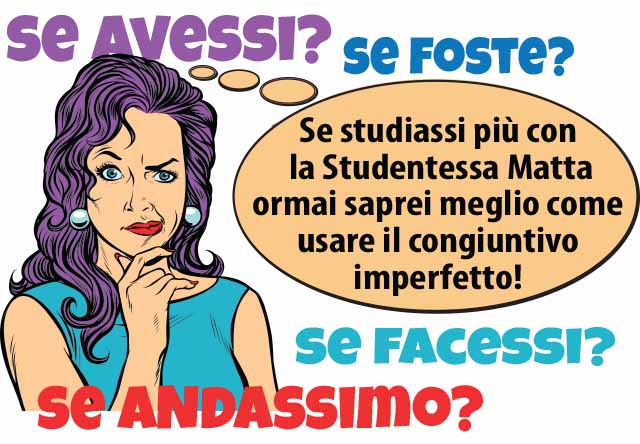
Congiuntivo imperfetto —
non è un’argomento di cui ridere…
o forse dovrebbe essere! LOL
Italian subjunctive imperfect tense — it’s no laughing matter… or maybe it should be! LOL
Quando i tempi verbali italiani diventano più difficili, gli studenti devono diventare più tosti. All’inizio, vai avanti e piangi alcune lacrime frustranti, ma poi ridi, e scoprirai che l’apprendimento diventa più facile.
When Italian verb tenses get harder, students have to get tougher. At first, go ahead and cry a few tears of frustration, but then laugh, and you will find learning gets easier.
Quando impari l’italiano avanzato e cerchi di padroneggiare tempi complessi, sei sicuro di fare errori, specialmente quelli umoristici. Invece di essere battute d’arresto, questi divertenti errori si conficcheranno nel nostro cervello e ricorderemo le regole grammaticali più che se memorizziamo un scheda di coniugazione. Quando ridiamo, il nostro cervello rilascia endorfine, che possono aiutare a ridurre lo stress e l’ansia e rendere l’apprendimento di una nuova lingua più divertente e gratificante.
When learning advanced Italian and trying to master complex tenses, students are bound to make errors, particularly humorous ones. Instead of being setbacks, these amusing errors will stick in our brains, and we will remember grammar rules more than if we memorize a rule or conjugation chart. When we laugh, our brains release endorphins, which can help reduce stress and anxiety and make learning a new language more fun and rewarding.
Mantenere il proprio senso dell’umorismo è essenziale quando ci si immerge più a fondo nell’apprendimento della lingua italiana e delle preposizioni, dei pronomi diretti e indiretti, e dei tempi complessi come l’imperfetto congiuntivo italiano e il congiuntivo trapassato.
Keeping your sense of humor is essential as you dive deeper into learning the Italian language and the prepositions, the direct and indirect pronouns, and the complex tenses like the Italian Subjunctive Imperfect and the Trapassato Subjunctive.
Cominciamo! Parliamo dell’Imperfetto Congiuntivo quando lo usiamo e perché.
Let’s jump in and talk about the
Subjunctive Imperfect when we use it and why.

Si usa l’imperfetto congiuntivo in italiano (e in altre lingue) per esprimere dubbi, incertezze o situazioni ipotetiche nel passato. Lo usiamo per parlare di idee che sono contrarie alla realtà. Si usa comunemente in italiano parlato o scritto.
We use the subjunctive imperfect tense in Italian (and other languages) to express doubt, uncertainty, or hypothetical situations in the past. We use it to talk about ideas that are contrary to reality. It is commonly used in both spoken and written Italian.
Spesso il tempo imperfetto congiuntivo è usato nelle clausole “se” per indicare una condizione che non è avvenuta o che è improbabile che si verifichi in passato. Ad esempio, nella frase “Se avessi più soldi, viaggerei di più in Italia”, il congiuntivo imperfetto viene utilizzato per esprimere una situazione ipotetica che non si è verificata in passato.
Often the subjunctive imperfect tense is used in “if” clauses to indicate a condition that did not happen or is unlikely to occur in the past. For example, in the sentence “If I had more money, I would travel more in Italy,” the subjunctive imperfect tense is used to express a hypothetical situation that did not occur in the past.

Un altro uso dell’imperfetto congiuntivo è nel discorso riportato, che può indicare dubbi o incertezze sulla veridicità della dichiarazione. Ad esempio, nella frase “Marco ha detto che avesse visto un fantasma”, il congiuntivo imperfetto “avesse visto” indica che l’oratore è incerto o ha un dubbio sulla verità della dichiarazione.
Another use of the subjunctive imperfect is in reported speech, which can indicate doubt or uncertainty about the statement’s veracity. For example, in the sentence “Marco said he had seen a ghost,” the subjunctive imperfect “had seen” indicates that the speaker is uncertain about the statement’s truth.
Il congiuntivo imperfetto è usato nelle clausole “che” dipendenti, invece del congiuntivo presente o passato, quando il verbo nella clausola principale è al passato o nel condizionale presente.
The imperfect subjunctive is used in dependent “che” clauses, instead of the present or past subjunctive, when the verb in the main clause is in the past tense or in the present conditional.
Esempi / Examples:

Pensavo CHE gli alieni fossero in un’altra galassia,
invece sono appena arrivati sulla Terra!
I thought aliens were in another galaxy,
but they just arrived on Earth!
Io non sapevo CHE gli alieni avessero così tanta fame.
I didn’t know that the aliens were so hungry.
Vorrei CHE ci fosse più tempo per scappare.
I wish there was more time to escape.
To form the imperfect subjunctive of most verbs, drop the —re from the infinitive and add the endings —ssi, —ssi, —sse, —ssimo, —este, —essero.
The following chart chose the imperfect subjunctive of regular -are, -ere, and –ire verbs.
Che io
Che tu
Che lui/lei
Che noi
Che voi
Che loro
Studiare
—are verbs
_______
Studiassi
Studiassi
Studiasse
Studiassimo
Studiaste
Studiassero
Prendere
—ere verbs
______
Prendessi
Prendessi
Prendesse
Prendessimo
Prendeste
Prendessero
Capire
—ire verbs
_____
Capissi
Capissi
Capisse
Capissimo
Capiste
Capissero
Il tempo imperfetto del congiuntivo italiano può
essere difficile da imparare per diverse ragioni.
The Italian Subjunctive Imperfect tense can be difficult to learn for several reasons.
- Complex conjugation: The subjunctive imperfect tense has several irregular verb conjugations that can be difficult to memorize. In addition, the verbs often have endings similar to other verb tenses, making them confusing to remember.
- Nuanced usage: The subjunctive imperfect tense is used to express hypothetical or uncertain situations, which can be more nuanced than other verb tenses. To use this tense correctly, students need to understand the language and the context in which the tense is used.
- Lack of exposure: Many learners of Italian may not have much exposure to the subjunctive imperfect tense in their native language, making it more challenging to understand and use.
- Regional variation: The subjunctive imperfect tense is used differently in different regions of Italy and even among different generations and social groups.
Ti stai divertendo? Stai già ridendo?
Are you having fun now? Are you laughing yet?

Ecco una piccola storia divertente per restaurare il tuo
umorismo e aiutarti con il congiuntivo imperfetto.
Here is a funny little story to restore your sense of humor
and help you with the Italian Imperfect Subjunctive.
C’era una volta, due viaggiatori americani di nome John e Sally che erano in visita in Italia per la prima volta. Stavano seguendo un corso di lingua italiana, e il loro insegnante aveva appena introdotto il congiuntivo imperfetto. Sia John che Sally trovarono difficile ricordare quando e come usarlo. Così una serata a Roma, quando erano fuori a cena in Piazza Navona al ristorante “da Paolo,” hanno deciso di praticare il congiuntivo imperfetto con il proprietario.
Once upon a time, two American travelers named John and Sally were visiting Italy for the first time. They were taking an Italian language class, and their teacher had just introduced the subjunctive imperfect tense. Both John and Sally found remembering when and how to use it challenging. So one night in Rome, when they were out for dinner in Piazza Navona at “da Paolo’s restaurant, they decided to practice the Subjunctive Imperfect tense with the restaurant owner.
Quando Paolo si avvicinò al loro tavolo per prendere le ordine, John chiese se ci fossero opzioni vegetariane. Ha cercato di dire in italiano, “Se ci fossero opzioni vegetariane, ne sceglierei una.” Ma invece, ha erroneamente detto, “Se fossi un’opzione vegetariana, sceglierei me stessa” (che si traduce in inglese: “If I were a vegetarian option, I would choose myself!”)
When Paolo approached their table to take their orders, John asked if there were vegetarian options. He tried to say in Italian, “If there were any vegetarian options, I would choose one.” (Se ci fossero opzioni vegetariane, ne sceglierei una per me.) But instead, he mistakenly said, “Se fossi un’opzione vegetariana, sceglierei me stessa” which translates to “If I were a vegetarian option, I would choose myself!”
Paolo, il cameriere, sembrava un po’ perplesso. Tuttavia, prima che potesse dire qualcosa, Sally, che era ancora strapiena dalla pasta carbonara che prendeva a pranzo, ma volendo dimostrare che anche lei poteva usare il congiuntivo imperfetto, voleva dire: “Se avessi fame, ordinerei una pizza”, (che in inglese è “If I were hungry, I would order a pizza.”) Ma invece, disse: “Se avessi fumo, ordinerei una pizza” (che significa, ”If I were smoke, I would order a pizza!”)
Paolo, the waiter, looked a bit perplexed. However, before he could say anything, Sally, who was still full from the pasta carbonara she had for lunch, but wanting to show that she too could use the subjunctive imperfect tense, said, “If I were hungry, I would order a pizza,” which in Italian is “Se avessi fame, ordinerei una pizza.” But instead, she said, “Se avessi fumo, ordinerei una pizza” which means, “If I had smoke, I would order a pizza!”
Paolo non ha potuto fare a meno di ridacchiare agli errori di John e Sally. Li ha gentilmente corretti e poi disse, “Siete molto impegnanti ad apprendere la nostra lingua! Tutti gli insegnanti d’italiano vorrebbero che fossero più studenti come voi.”
Paola couldn’t help but chuckle at John and Sally’s mistakes. He kindly corrected them and then said, “You both are very determined to learn our language! All Italian teachers would like more students like you.
Gesticolando con le braccia, Paolo disse, “Se fosse possibile, vi porterei tutti i piatti sul menu. Invece, vi porterò i piatti del giorno.”
Gesticulating with his arms, Paolo said, “If it were possible, I would bring you all the dishes on the menu. Instead, I will bring you the dishes of the day.”
Il proprietario se ne andato in cucina ed è tornato con un grande piatto di parmigiana di melanzane vegetariana per John e una pizza al forno per Sally che sapeva di fumo di legno.
The restaurant owner disappeared into the kitchen and returned with a big plate of vegetarian eggplant parmesan for John and a pizza for Sally that had the delicious aroma of wood smoke.
Dopo aver riflettuto tanto sul Congiuntivo Imperfetto, Sally aveva sviluppato un certo appetito. Lei iniziò a mangiare la sua pizza e John iniziò a divorare la sua parmigiana di melanzane, facendo suoni soddisfatti riconoscenti facilmente comprensibili in qualsiasi lingua.
After thinking so hard about the Subjunctive Imperfect tense, Sally had worked up an appetite. Hungrily she began eating her pizza e John started devouring his eggplant parmesan, making satisfied sounds easily understood in any language.
Sorridendo, Paola disse: “Siete così simpatici… se foste un dolce al cioccolato, vi mangerei in un boccone!” Raccogliendo la caraffa di vino, riempì i loro bicchieri. Poi aggiunse con un occhiolino, “Se il vino parlasse, staremmo tutti zitti!”
Smiling, Paola said, “You are so nice…. If you were a chocolate cake, I would eat you up!” Picking up the carafe of wine, he refilled their glasses. Then he added, winking, “If wine could talk, we would all keep our mouths zipped.”
Brindando al cameriere e al congiuntivo imperfetto, John e Sally non potevano fare a meno di ridere. Da quel giorno in poi, hanno fatto un patto per continuare a praticare il congiuntivo imperfetto fino a quando non l’hanno capito bene. Di conseguenza, le loro coniugazioni sono state impeccabili la prossima volta che hanno cenato nel ristorante di Paolo.
Toasting the waiter and the Subjunctive Imperfect tense, John and Sally couldn’t help but laugh. From that day forward, they made a pact to continue practicing the subjunctive imperfect tense until they got it right. As a result, their conjugations were flawless the next time they dined in Paolo’s restaurant.











